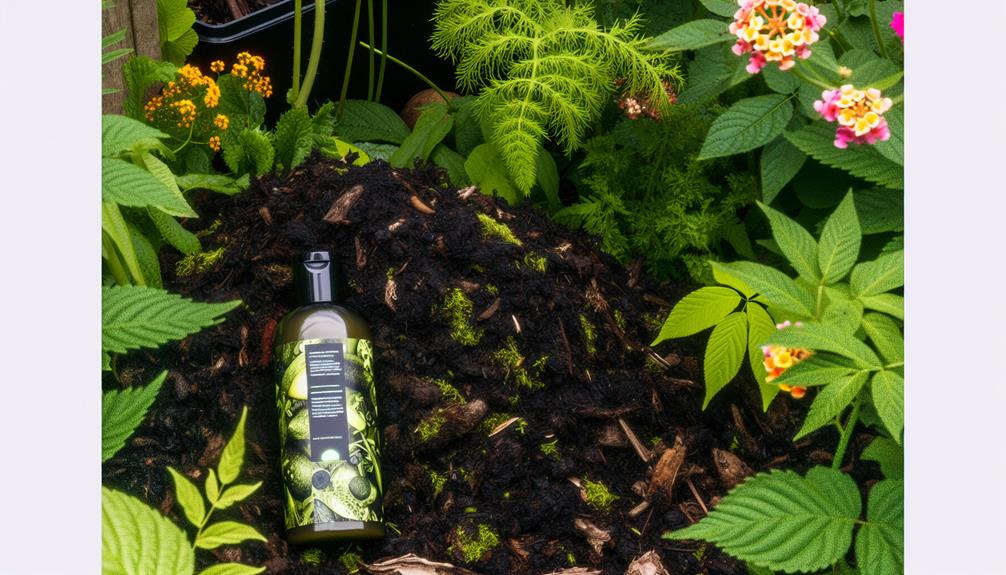

You can’t compost regular body wash due to its synthetic ingredients like surfactants, preservatives, and fragrances, which don’t break down easily and can harm the environment. Instead, look for biodegradable body washes with natural ingredients like coconut oil and shea butter, which are eco-friendly and break down in compost.
Alternatively, consider using solid soap bars made of natural components. For conventional body wash, use proper disposal methods like community programs designed to handle personal care products safely. By switching to sustainable products and disposing of them responsibly, you help protect the planet and foster community. Want more tips? Keep exploring!
At its essence, composting is the natural process of recycling organic matter, like leaves and food scraps, into a valuable fertilizer. You’re basically mimicking nature’s way of breaking down organic materials to create nutrient-rich soil.
Imagine a community garden where everyone contributes their kitchen scraps, and in return, everyone reaps the benefits of healthier plants. Composting can create that sense of belonging and shared purpose. It’s a simple yet powerful action that reduces waste and enriches the earth.
To start, you’ll need a balanced mix of green materials, like fruit peels, and brown materials, like dried leaves. Regularly turn your pile to keep it aerated, and in no time, you’ll have dark, crumbly compost ready to nourish your plants.
Also Read: Can You Compost Asparagus?
Body wash often contains a blend of surfactants, moisturizers, and fragrances to cleanse and hydrate your skin. Surfactants, like sodium laureth sulfate, help create a rich lather that lifts away dirt and oil.

Moisturizers, such as glycerin or shea butter, guarantee your skin stays soft and smooth, preventing dryness. Fragrances, both natural and synthetic, give body washes their appealing scents, making your shower experience delightful.
Additionally, you might find preservatives like parabens to maintain shelf life, and dyes to give the product a vibrant color. Understanding these ingredients helps you make informed choices, ensuring that your skin care routine aligns with your values and needs. You’re part of a community that cares about what touches your skin.
Choosing between organic and synthetic ingredients in body wash often depends on your personal preferences and values. Organic ingredients come from natural sources, offering you a more eco-friendly and skin-friendly option. They usually contain fewer chemicals, making them ideal if you have sensitive skin.
Organic ingredients break down more easily, making them better for the environment. They tend to be gentler and less likely to cause irritation. Organic farming practices can be more sustainable and support biodiversity.
On the other hand, synthetic ingredients are engineered for consistency and effectiveness. They can offer advanced benefits like longer shelf life and specialized skincare properties. Your choice reflects not just your skin’s needs but also your environmental and ethical values.
Also Read: Can You Compost Animal Hair?
When you’re selecting a body wash for composting, it’s essential to zero in on biodegradable ingredients. Seek out key natural components like plant-based oils and extracts, which break down easily and nourish the soil.
Additionally, eco-friendly surfactants and organic scent additives guarantee that your body wash is gentle on both your skin and the environment.
Natural components like coconut oil and shea butter are essential in crafting biodegradable body washes that are both effective and eco-friendly. These ingredients break down naturally, ensuring your body wash won’t harm the environment.
You’ll love knowing you’re using products that are kind to the planet and your skin.
Consider these key natural components:
Using body washes with these biodegradable ingredients helps you connect with a community that values sustainability and natural living.
Beyond nourishing oils and butters, eco-friendly surfactants play a vital role in making body washes biodegradable and gentle on the environment. These surfactants, derived from natural sources, break down easily, reducing pollution and protecting aquatic life. They’re designed to cleanse effectively without the harsh chemicals that can harm our planet.
Here’s a quick look at some common eco-friendly surfactants:
| Surfactant | Source | Benefits |
|---|---|---|
| Coco Glucoside | Coconut oil and sugar | Gentle on skin, biodegradable |
| Decyl Glucoside | Corn glucose | Mild, non-irritating |
| Sodium Cocoyl Isethionate | Coconut oil | Effective, lathers well |
Incorporating organic scent additives into body washes not only enhances the user experience but also guarantees that the product remains eco-friendly and biodegradable. These natural fragrances come from essential oils and plant extracts, ensuring that your body wash smells incredible without harming the planet.
When choosing body washes with organic scent additives, you’re supporting:
When selecting a body wash for composting, you should avoid harmful chemicals like parabens, sulfates, and synthetic fragrances. These substances can disrupt the composting process, harming beneficial microbes and insects.
Parabens, often used as preservatives, can remain in the soil, potentially affecting plant growth. Sulfates, which create lather, can be harsh on both the environment and your skin, leading to residue that doesn’t break down easily.
Synthetic fragrances might smell great, but they often contain phthalates, which are harmful to both you and the earth. By choosing body washes free from these chemicals, you’re not just helping the planet, you’re joining a community dedicated to sustainable living and making a positive impact together.
Now that you know which harmful chemicals to avoid, let’s explore some eco-friendly body wash options that are safe for composting. Choosing the right body wash not only benefits your skin but also helps the environment.
Look for products that use natural ingredients and sustainable packaging. Here are three excellent eco-friendly body wash options:
Ever wondered how you can create your own natural body wash at home? It’s easier than you think, and you’ll love the sense of belonging that comes from using something you made yourself.
Start with a base of liquid Castile soap, which is gentle and eco-friendly. Add a few tablespoons of organic honey for its moisturizing properties. Next, mix in some essential oils like lavender or tea tree for a soothing scent and antibacterial benefits.
Finally, incorporate a bit of olive oil or almond oil to nourish your skin. Combine all ingredients in an old body wash bottle, shake well, and you’re ready to go! This homemade body wash is free of harmful chemicals and perfect for anyone seeking a natural lifestyle.
Also Read: Can You Compost Ash From Wood?
When it comes to disposing of body wash, you have several eco-friendly methods to explore. Understanding the chemical breakdown process helps you see why some ingredients shouldn’t go down the drain, while eco-friendly alternatives minimize environmental impact.

Additionally, community disposal programs offer a responsible way to handle leftover products, ensuring they’re dealt with safely.
To properly dispose of body wash, you need to understand the chemical breakdown process it undergoes. Body wash typically contains surfactants, preservatives, and fragrances, which can impact the environment if not disposed of correctly.
When body wash enters the water system, it undergoes a series of chemical reactions. Here’s what happens:
Understanding these components helps you make informed choices about disposal, ensuring you’re doing your part to protect our planet.
Instead of discarding body wash down the drain, consider using eco-friendly alternatives that minimize environmental impact. Solid soap bars, especially those made with natural ingredients, are an excellent choice. They’re often packaged in recyclable or biodegradable materials, reducing waste.
Look for brands that prioritize sustainability and avoid harmful chemicals. You could also try making your own body wash using simple, natural ingredients like coconut oil, essential oils, and castile soap. This guarantees you know exactly what’s in your product.
Additionally, many stores now offer refill stations for liquid soaps, allowing you to reuse your containers. By opting for these eco-friendly alternatives, you’re not just helping the planet, but also joining a community of like-minded individuals who care about making a difference.
Consider participating in community disposal programs designed to handle personal care products responsibly. These programs help guarantee that items like body wash don’t harm the environment. You’ll find that joining these initiatives not only benefits the planet but also fosters a sense of community.
Here’s how you can get involved:
Choosing eco-friendly body wash options can greatly reduce your environmental footprint. By selecting products with natural ingredients and minimal packaging, you’re making a positive impact.
Look for body washes with biodegradable formulas, which break down more easily and don’t pollute waterways. Also, consider brands that use recycled or recyclable packaging.
When you choose these sustainable options, you’re not just helping the planet—you’re also joining a community of like-minded individuals committed to making a difference.
Pay attention to labels indicating cruelty-free and vegan products, as these align with ethical practices. Supporting companies that prioritize sustainability can inspire others to follow suit, creating a ripple effect of positive change.
Your choices matter, and together, we can make a significant impact.
You can make a big impact by choosing eco-friendly body wash options or even creating your own natural recipes. Always check the ingredients—go for biodegradable and organic whenever possible.
By composting properly and making sustainable choices, you’re not just helping the environment, but also promoting a healthier lifestyle. Remember, every small step counts, and your conscious decisions can lead to a greener planet.
So, start today and embrace a more sustainable way of living!
